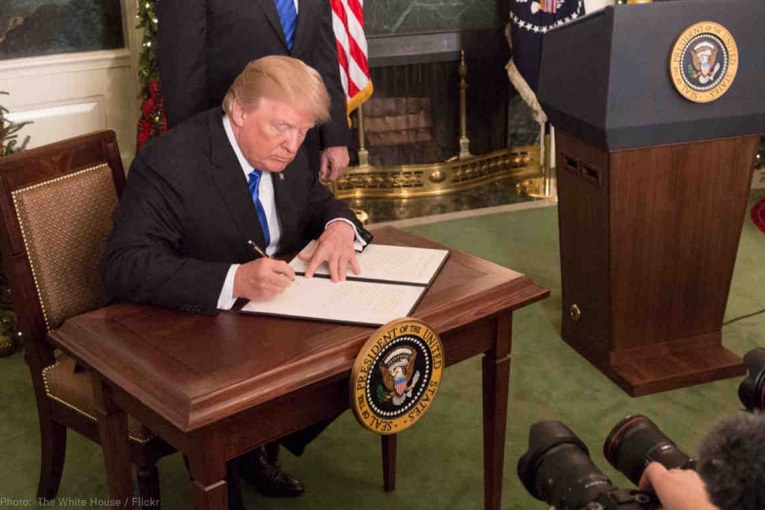
WASHINGTON D.C. – A federal judge Thursday temporarily halted President Donald Trump’s executive order aimed to terminate automatic citizenship for children born on American soil, marking the first setback of the president’s attempts to change the nation’s immigration laws and undo decades of precedent, reported the New York Times.
Federal District Court Judge John C. Coughenour “sided with Washington, Arizona, Illinois and Oregon, the four states that sued, signing a restraining order that blocks Mr. Trump’s executive order for 14 days, renewable upon expiration,” reported NYT.
This hearing was held only three days after President Trump issued his executive order.
The NYT quoted Judge Coughenour, who stated, “This is a blatantly unconstitutional order. Frankly… I have difficulty understanding how a member of the bar would state unequivocally that this is a constitutional order. It just boggles my mind.”
President Trump later responded to this, informing reporters at the White House, “Obviously we’ll appeal it,” reported NYT.
According to NYT, this order is one of several issued by the president during his opening hours in efforts to “curtail immigration, both legal and illegal, declaring that children born in the United States to undocumented immigrants after Feb. 19 would no longer be treated as citizens.”
The order also applied to babies who were born to mothers “who are in the country legally but temporarily, such as tourists, university students or temporary workers, if the father is a noncitizen.”
To halt the executive order, at least 22 states, activist groups and expectant mothers filed six lawsuits arguing the executive order violates the 14th Amendment, wrote NYT.
The Times adds, “Legal precedent has long interpreted the amendment — that ‘all persons born or naturalized in the United States, and subject to the jurisdiction thereof, are citizens of the United States’ — applies to every baby born in the United States, with a few limited exceptions.”
Those exceptions, the NYT wrote, are “[c]hildren of accredited foreign diplomats; children born to noncitizens on U.S. territory occupied by an invading army; and, for a time, children born to Native Americans on reservations.”
The NYT added, “The courts have never recognized the constitutional legitimacy of further limitations on birthright citizenship” and Judge Coughenour did not appear to side with breaking that pattern.
Judge Coughenour’s order establishes the state of what will certainly be a long battle between President Trump’s second-term agenda and the courts, the NYT explained, noting Trump’s agenda “seeks to transform American institutions in ways that could be interpreted as running afoul of law and precedent.”
NYT quoted Judge Coughenour stating, “I’ve been on the bench for over four decades…This is a blatantly unconstitutional order. Where were the lawyers when this decision was being made?”
Nominated to the bench by President Ronald Regan, the NYT said, Judge Coughenour was brought a case where four state attorneys general argued that President Trump’s order would “deny rights and benefits to more than 150,000 children born each year and leave some of them stateless. States would also lose federal funding for various assistance programs.”
With cited testimony from former Assistant Attorney General Walter Dellinger, the states’ complaint was composed in 32 pages, stated the NYT, adding Dellinger spoke to Congress in 1995, noting “that a law limiting birthright citizenship would be ‘unconstitutional on its face’ and that even a constitutional amendment would ‘flatly contradict the nation’s constitutional history and constitutional traditions.'” A court in Massachusetts is considering a separate federal lawsuit filed by at least 18 other states and two cities also challenging the executive order, adds the Times, noting, “Four other lawsuits by activists and pregnant mothers have been filed in the district courts of Maryland, Massachusetts and New Hampshire, as well as the Central District of California.”
California Attorney General Rob Bonta filed a lawsuit challenging the Trump Administration’s unconstitutional executive order seeking to end birthright citizenship (State of California Department of Justice).
Under the Fourteenth Amendment to the U.S. Constitution, all children born on U.S. soil are automatically granted U.S. citizenship and the rights and privileges that come with it,” according to the Office of the Attorney General (OAG) .
The lawsuit is based on a 1898 U.S. Supreme Court case where “Wong Kim Ark, a San Francisco-born, Chinese-American man… had been denied his re-entry rights after a trip abroad” according to the OAG, noting the top court upheld the man’s rights.
According to California’s DOJ, at least 18 state attorneys general have argued, “President Trump’s unprecedented executive order violates the Fourteenth Amendment of the United States Constitution and Section 1401 of the Immigration and Nationality Act and should be immediately blocked from going into effect while litigation proceeds.”
Attorney General Bonta said attorneys “are asking a court to immediately block this order from taking effect and ensure that the rights of American-born children impacted by this order remain in effect while litigation proceeds. The President has overstepped his authority by a mile with this order, and we will hold him accountable.”
The AG explained, “The Fourteenth Amendment’s Citizenship Clause explicitly promises all “persons born or naturalized in the United States, and subject to the jurisdiction thereof, are citizens of the United States and of the State wherein they reside.”
The AG added the executive order “directs federal agencies to prospectively deny the citizenship rights of American-born children whose parents are not lawful residents” and “instructs the Social Security Administration…to cease issuing social security numbers and U.S. passports to these children, and directs all federal agencies to treat these children as ineligible for any privilege, right, or benefit that is reserved by law to individuals who are U.S. citizens.”
According to the AOG the lawsuits were filed by California, “New Jersey, Massachusetts, Colorado, Connecticut, Delaware, Hawaii, Maine, Maryland, Michigan, Minnesota, Nevada, New Mexico, New York, North Carolina, Rhode Island, Vermont and Wisconsin, along with the City of San Francisco.”